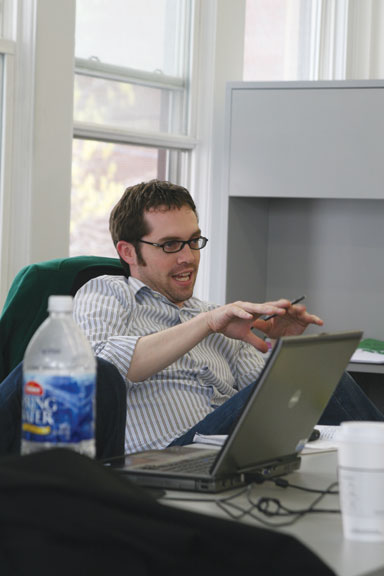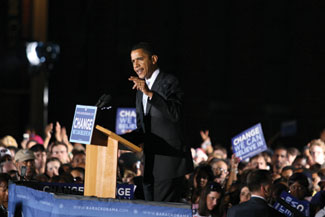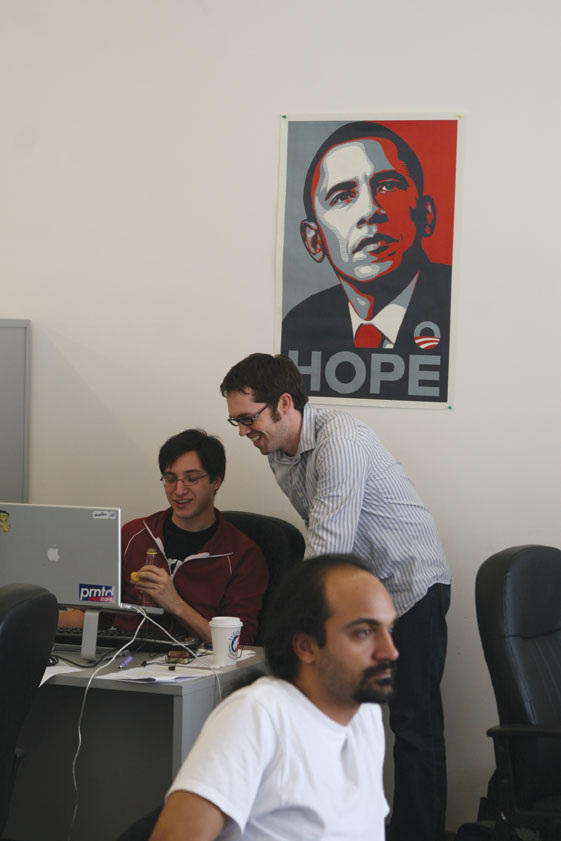In one of the best stories of the 2008 political year, a Wabash man brought his community organizing approach to the Democratic primary in South Carolina and changed the way political campaigns are run.
 Barack Obama’s campaign was centered on change.
Barack Obama’s campaign was centered on change.
There was "Women United for Change," the "Register for Change" tour bus, and hamburgers and politics were on the menu at the "Cookouts for Change."
Yet it was a Wabash man working in a political crucible in the Deep South who helped change the way political campaigns are run.
How did he do it? By changing the status quo, of course.
Jeremy Bird ’00 was Obama’s field director for the January 26 South Carolina primary. Instead of the same ol’ games, Bird used skills learned at Wabash and community organizing principles from his Harvard days to mobilize the state for the Illinois senator. Instead of the 10% to 11% win polls predicted, Obama defeated Senator Hillary Clinton by nearly 29 points.
"South Carolina is a political state and we changed the way politics are done," Bird said before the Pennsylvania primary. "People don’t organize there. We were told, ‘This is the way you run a campaign—you pay the ministers, you pay the state senators to get out their vote, and you run an endorsement-heavy campaign.’
"When you’re done, though, you haven’t built anything to leave behind. That is exactly how Clinton ran her campaign there. If we end up winning this thing, the experts will say Iowa and South Carolina were huge turning points."
Of course, Obama did "win this thing," and his organizing effort has been lauded from South Carolina to his 50-state effort in the recent general election.
Jon Carson, Obama’s national field director for the general election, calls Bird one of the top field people in the country. "The work he did in South Carolina, Maryland, Pennsylvania, and in Ohio (for the general election) was a major factor in the Obama campaign’s success," Carson said. "Jeremy is a great leader who inspires the people that work for him, and he has been the most important innovator of all the people in our field program."
Jeremy spent a good portion of his summer preparing for the general election in his role as general election chairman for Ohio. In May and early June, he co-led an effort to compile the campaign’s best practices in field efforts. Carson said, "The methods Jeremy fine-tuned in South Carolina and Pennsylvania have been adopted throughout the country."
In Barbershops and Beauty Salons
During an April visit, Bird was sitting in the second floor of an old office building in downtown Philadelphia. The office was packed with about 40 people, all probably under 30 years old, and everyone coddled a BlackBerry, iPhone, or similar device, texting, calling, or checking news results at a hard-to-describe frenetic pace. For those Obama workers, the day usually started around 9 or 10 a.m. and often would not end until midnight or later—seven days a week!
Bird loved it.
"People around me energize me," he said. "You go out of this office where these kids are working, and they’re working really, really hard, and you get energized by what they bring."
It was just five days before the crucial Pennsylvania primary, where Bird was serving as field director, but he was happy to talk about the South Carolina stunner.
Instead of chicken dinners, signs at football games, and "paying off a lot of people on election day," Bird said his team launched a community-organizing effort that’s still in place.
"We had to build from almost nothing. We knew we didn’t have the establishment with us," he said. "We ran a house meeting program. We found anybody who was with us and told them to bring somebody with them. Someone from the organization would go to these meeting and help people build their own network. We had a lot of unregistered people who’d never been involved in politics before.
"It’s a lot harder than just paying people," Bird said of the community organizing approach he’d learned from his mentor Marshall Ganz at the Harvard Kennedy School of Government. "It means being in the community. When an organizer works for me they should know more about the community they live in than somebody who has lived there 15 years."
Yet while Harvard University and community organizing may sound pretty sophisticated, it’s simplicity that makes it work.
"People told us we should go to the barbershops and beauty salons in these communities," Bird said. "That’s where people talk about politics and that’s where people are real. We got into those places and got them talking about Barack and made it okay for them to vote for him.
"No one had ever done this—come see them."
And Bird brought more to those meetings than politics.
"As a kid, I remember sitting in the hallway of my family’s trailer in High Ridge, Missouri listening to my parents’ kitchen table conversations," Bird had written. "They would talk late at night, worrying about how we would piece things together so that we could afford food until the next?paycheck, or how they would be able to pay for my and my older brother’s health care needs. I wondered why my parents, who went to work every day, were forced to have such tough conversations.?
"That experience instilled in me a deep sense of economic justice…I took that sense of economic justice to political campaigning."
A Harvard Divinity School grad with that sort of history and integrity was tough to dismiss.
A Spirit of Power
 Bird’s Southern Baptist roots also made him a good choice for the campaign in South Carolina, although he probably never imagined himself preaching in southern African-American churches, as he did on several occasions.
Bird’s Southern Baptist roots also made him a good choice for the campaign in South Carolina, although he probably never imagined himself preaching in southern African-American churches, as he did on several occasions.
"You can’t get up there and talk about Barack Obama," he said. "But you can talk about the need to be engaged in politics. I used a verse from 2 Timothy: "For God didn’t give us a spirit of fear, but of power, love, and self-control." The message was when we make decisions they should be about our ability to make decisions to better our lives, not decisions made out of fear."
The organizers were reaching out to the black community, often with white volunteers.
"We saw these teams come together who were black and white. That’s never happened before in South Carolina politics. We sent white people into black barbershops and black organizers into white communities.
"We said we’re going to run our campaign in communities where people live. And if there is segregation, we’re not going to run that way. We’re going to run this campaign the way Obama is talking. People said we were crazy."
But early on, Bird saw a turning point that proved his approach had merit. A major door-to-door canvassing was scheduled after the campaign had spent nearly three months setting up house meetings and growing the network. It was a 95-degree day with high humidity. Still, more than 300 people showed up—six months before the election. Bird knew he was on to something.
"I wasn’t surprised, because we’d been building real relationships. If people get involved and they feel like they are part of something and they’re valued, they will turn out to help."
All Caught Up in It
Bird is no stranger to change in his life. As a Wabash religion major he traveled to Israel as a junior.
"While I was there I got fascinated by the whole Arab-Israeli conflict and the role religion plays in politics," he explained. "I knew then when I went to graduate school that I wanted to do conflict resolution. I went into religion at Harvard, partly, because that’s what I knew."
The community organizing class with Ganz at the Kennedy School further spurred his interest in politics. After he earned his master’s and taught for a semester at Harvard, he went to work for Howard Dean’s presidential campaign.
"And then we had our little scream episode," Bird joked about Dean’s now infamous yelp after his second-place
finish in the Iowa primary. But the political bug had its hook into the former Bachelor writer and founder
of Wabash’s lacrosse program. He signed on with John Kerry’s presidential campaign and did field work through the general election.
Then he ended up in a campaign of a different sort, working for Wake Up Wal-Mart, a group largely focused
on bringing health benefits to Wal-Mart employees.
During that time, he read Obama’s books, Audacity of Hope and Dreams of My Father.
"I just think it would be really neat to have a president who gets what real life is like," Bird said. "Most people who run for office are wealthy or they have some roots in politics, but Barack has sat down at tables and
helped people figure out how to get asbestos out of their community. That’s a really hard job. You get to know people from those experiences when you really learn to relate to them."
Bird’s passion for the candidate and cause makes it easier to put in the long days, weeks, and months. "It’s a hard lifestyle," he finally admitted. "You can’t be married and have kids and do this. It’s really a consuming thing. If you believe in it, you get all caught up in it.
"I really want this guy to win. You have to get your juice from different places and I get a lot of it from listening to the stories of people out in the field. I believe in Barack. I believe in his ability to carry out what he is saying. I believe in the way we are organizing and the way we’re reshaping the way politics is run."
"The Stupidest Idea Ever"
Pennsylvania was a tough assignment. The Jeremiah Wright controversy broke and Obama’s comments about "bitter" residents feeling left behind made things especially tough.
But Bird can laugh about one tough Pennsylvania episode that none of the young staffers let him forget.
 Obama had a trip planned to Altoona to play basketball. Bird came up with what he thought was a sure-fire political winner. "My idea was for him to go bowling," Bird admitted with a smirk. People close to Obama said the candidate didn’t bowl. "I said,‘You don’t go into a bowling alley just to shake hands—you bowl.’"
Obama had a trip planned to Altoona to play basketball. Bird came up with what he thought was a sure-fire political winner. "My idea was for him to go bowling," Bird admitted with a smirk. People close to Obama said the candidate didn’t bowl. "I said,‘You don’t go into a bowling alley just to shake hands—you bowl.’"
Of course, the kicker to the story was video of Obama bowling— gutter balls—shown on television over and over for several nights.
"I was listening to MSNBC’s Joe Scarborough the next morning, and he said ‘Whatever campaign staffer had that idea…it has to be the stupidest idea ever.’
"Well, that was me!"
But dubious suggestions were far outweighed by innovation. Even Pennsylvania Governor Ed Rendell, a strong Clinton supporter, praised Bird’s efforts.
"They don’t get enough credit because Senator Clinton won the [Pennsylvania] primary by 10 points," the governor told the press. "But they registered unprecedented numbers of voters and did a Herculean job of getting them to the polls. They do that better than anyone I’ve seen."
Bird, a young man who doesn’t struggle for words, had to ponder why he has become so good at organizing political efforts.
"I like it. I love it," he said without much thought. But then he became more reflective. "I’m pretty impatient. I get bored when I do a typical desk job.
"I love people, and this organization is really about dealing with people. I think I’m pretty aggressive and you have to be aggressive, but tactful. I was taught a level of humility as a Baptist. You don’t have to know everything, but you just can’t sit back. You have to be aggressive to make sure everything gets done. When you want to leave at 8 p.m. but you have two other things to do, you have got to stay and finish them or the days will catch up to you." Finding the energy isn’t always easy, Bird said. But he was leaving the office that night, April 18, to attend Obama’s rally at Independence Park. More than 35,000 people showed up to hear the candidate. Bird said that type of event always keeps him going.
The Reward
Bird has had plenty of personal interaction with Obama. He met him at stops during the South Carolina campaign and traveled with him an entire day in Maryland. But he admits field organizers don’t spend much time with the candidate. The day of the Independence Park rally he was busy making sure key volunteers got the best tickets to see Obama up-close—a reward for their organizing efforts.
Bird is unsure what his reward will be once the general election is over. "I’m not in this because I want to work for the government. I want him to win. But I think if he wins, I would want to be a part of that change. I think he could really do things."
He knows he has gained important skills from the year and a half on the campaign—skills he can use regardless of who wins the presidency.
"You have to focus on the things you can control, and there’s nothing worse in a political campaign than thinking you can control everything," he said. "What I can control is running the best field program possible. I think I’ve calmed down a lot. I worry less about things."
Bird’s focused efforts have won national accolades for his organizing in South Carolina. But it is a short encounter with the senator that he treasures most.
It was 4 p.m. on January 26, the night of the South Carolina primary. The phone rang and early numbers indicated Obama would win much bigger than anticipated—news that would stun the political punditry and experts. Bird didn’t know whether to believe what he had heard or not; the margin was too big.
"No one thought we’d win by that margin. It was vindication for everything, all the struggles, dealing with the naysayers, and knowing we were doing it in a way in line with our candidate’s message. We didn’t pay anybody, no street money, no paid canvassers, nothing —yet we had 10,000 volunteers"
At 7:01 p.m. the national networks called the state for Obama, and staffers knew the win was going to be game-changing.
"It was historic," Jeremy mused. "I could feel I was part of something historic."
Later that night a party was held for volunteers and Obama was scheduled to appear. More than 5,000 people showed up who couldn’t get in. Obama made his speech and started to work the rope line on his way out of the building. Jeremy, who rarely attends such events, made his way toward the senator.
Obama eyed Bird and sought him out. He put his arms around the Wabash man’s shoulders, gave him a huge hug, and said, "I’m really proud of you."
It was all the reward Jeremy Bird wanted or needed.